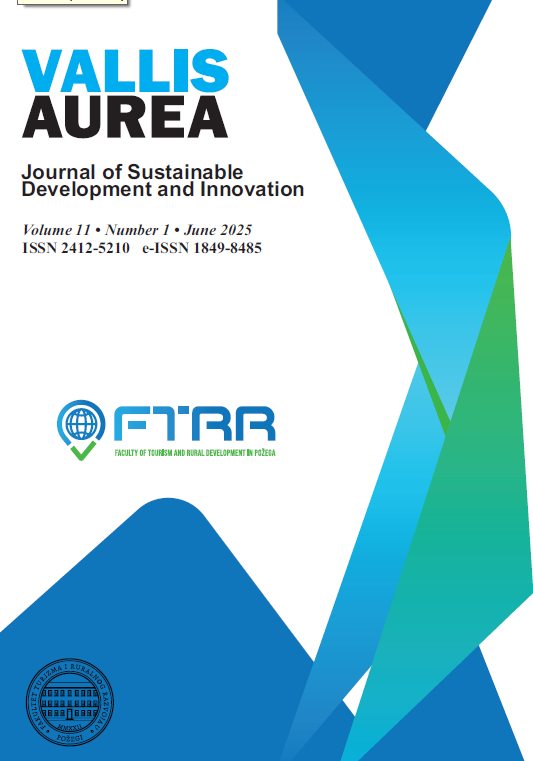Application of Smart Technologies in The Integration of Local Resources for Sustainable Destination Management
DOI:
https://doi.org/10.62598/JVA.11.1.4.15Keywords:
smart technologies; sustainable management; local resources; smart destination; tourism; collaborationAbstract
The research has shown that smart technologies can signifi cantly improve the integration of local resources into sustainable destination management, but this potential depends on strategic alignment, digital infrastructure readiness, and stakeholder coordination. Practical implications point to the need for continuous training of destination managers, investment in digital
tools tailored to local specifi cities, and adaptive governance frameworks. The study’s limitations include a limited geographic sample and reliance on secondary data for benchmarking, while future research should expand on empirical fi eldwork and explore comparative cross-country models. Lessons learned suggest that smart solutions should not be treated as universal tools, but as contextual instruments aligned with the social, ecological and technological maturity of each destination.
References
1. Boes, K., Buhalis, D. & Inversini, A. (2016). Conceptualising Smart Tourism Destination Dimensions. Information Technology & Tourism, 15(4), pp. 404-421.
2. Buhalis, D. & Amaranggana, A. (2013). Smart Tourism Destinations. Information andCommunication Technologies in Tourism 2013, pp. 553-564.
3. Dwyer, L. (2018). Emerging Issues in Tourism: Implications for Competitiveness and Sustainability. Tourism Recreation Research, 43(2), pp. 150-163.
4. Egresi, I. & Polat, D. (2019). Tourism Stakeholder Collaboration in Emerging Destinations: A Smart Approach. Tourism Management Perspectives, 30(4), pp. 125–127.
5. Gretzel, U., Sigala, M., Xiang, Z. & Koo, C. (2015). Smart Tourism: Foundations and Developments. Electronic Markets, 25(3), pp. 179-188.
6. Gretzel, U., Sigala, M., Xiang, Z., & Koo, C. (2020). Smart tourism challenges. Journal of Tourism Management, 79, 104089. https://doi.org/10.1016/j.tourman.2020.104089
7. Hall, C. M., Gössling, S. & Scott, D. (2015). The Evolution of Sustainable Tourism and Sustainable Mobility. Journal of Sustainable Tourism, 23(5), pp. 7-27.
8. Hribar, M., Gržinić, J., Zanker, J. & Skok, M. (2021). Implementing Smart Tourism in Croatia:Challenges and Opportunities. Sustainability, 13(2), pp. 85-105.
9. Ivars-Baidal, J. A., Celdrán-Bernabeu, M. A. & Mazón, J. (2019). Smart Destinations and the Evolution of ICTs: A New Scenario for Destination Management?. Current Issues in Tourism, 22(8), pp. 90-102.
10. Koo, C., Park, J., & Lee, J. (2021). AI in smart tourism: Opportunities and challenges post- COVID. Information Technology & Tourism, 23, 351–365. https://doi.org/10.1007/s40558-021-00214-3
11. Koo, C., Shin, S. & Gretzel, U. (2017). Conceptualizing Smart Tourism Ecosystems: Implications for Destination Management. Journal of Travel & Tourism Marketing, 34(3), pp. 355–359.
12. Marasco, A., De Martino, M., Magnotti, F. & Morvillo, A. (2018). Collaborative Innovation in Tourism and Hospitality: A Systematic Review of the Literature. International Journal of Contemporary Hospitality Management, 30(6), pp. 63-82.
13. Mariani, M. M., & Baggio, R. (2022). Big data and analytics in tourism and hospitality: A perspective article. Tourism Review, 77(1), 1–5. https://doi.org/10.1108/TR-03-2021-0122
14. Sigala, M. (2023). Digital transformation in tourism: A framework for innovation. Current Issues in Tourism, 26(3), 421–437. https://doi.org/10.1080/13683500.2022.2066827
15. Tomljenović, M. (2021). Transformativni potencijal IoT rješenja za održivi razvoj ruralnog turizma. Vallis Aurea, 7(1), pp. 15–17.
16. UNWTO (2018). Overtourism? – Understanding and Managing Urban Tourism Growth beyond Perceptions. Madrid: UNWTO.
17. WTTC (2017). Travel & Tourism Economic Impact 2017. London: World Travel & TourismCouncil.
18. Vidović, M. (2022). Digitalne platforme za očuvanje kulturne baštine u Slavoniji. Vallis Aurea,8(2), pp. 33–36.
19. Zhang, Y., Li, X. R., Cao, M. & Liu, C. (2019). Smart Tourism: A New Approach to Location- Based Recommendation. Journal of Destination Marketing & Management, 12(3), pp. 3-16.
Downloads
Published
Issue
Section
License
Copyright (c) 2025 Vallis Aurea

This work is licensed under a Creative Commons Attribution-NonCommercial-NoDerivatives 4.0 International License.
Authors of papers for publishing in the journal agree under a Creative Commons Attribution-NonCommercial-NoDerivatives 4.0 International License.https://creativecommons.org/licenses/by-nc-nd/4.0/







